- Home
- Parnell Hall
05-Client Page 2
05-Client Read online
Page 2
I hated to see my potential client going south, but I stood my ground. “I’m sorry, but I can’t do it,” I said. “Perhaps you can find another detective who can.”
I’d struck the right chord. He frowned, thought that over. By the time he hunted up another private detective and went through the same spiel, it would be too late to do anything today anyway.
He took a breath, blew it out again, and sat back down. “All right,” he said. “Tomorrow.”
“Fine,” I said. “Now let’s get some of the details cleared out of the way.”
“Like what?”
“Well, for starters, how will I spot the young lady in question?”
He frowned. “Of course. How stupid of me. I told you, I’m new at this game.” He reached into his jacket pocket. “I forgot to give you the snapshot. Here it is.”
He pulled it out and laid it on the desk.
I picked it up and looked at it, and my estimation of Marvin Nickleson shot up considerably.
It was a closeup of Monica Dorlander Nickleson’s face. It was only a Polaroid, but blown up it could have passed for a portfolio picture. Marvin Nickleson’s estranged wife was gorgeous. Jet black hair pulled straight back from a lean yet soft-featured face. High arched eyebrows, gently rounded nose, lips full yet not too full. A face carefully made up to show not a trace of makeup. The type of face you’d expect to see on the cover of a fashion magazine.
I wasn’t sure how a real private detective would react. Whistle? Say, “That’s some dame.” I mean, this was the husband after all, and the estranged one at that. Under the circumstances, any comment could seem unfeeling and crass.
I merely nodded and said, “This will do fine.”
Apparently he’d expected comment. He cocked his head and said, “You can see why I want her back.”
“That I can. O.K., that takes care of spotting her coming out of her office building. Now, your apartment house. What kind of building is it and how do I get in?”
“You don’t.”
“Oh?”
He shook his head. “You couldn’t get in anyway. It’s a modern high-rise. Security is tight. All visitors are stopped in the lobby. So you don’t go in. You stake it out outside.”
“Then how can I tell who’s calling on her?”
“You can’t. But it doesn’t matter.”
“Oh?”
“Yeah. See, I don’t have to worry about that. The security works both ways. If she’s seeing someone, she won’t have him come to her apartment. ’Cause they’d stop the guy in the lobby before they’d let him up. I wouldn’t need to hire a private detective. I could prove she was seeing someone just by slapping a subpoena on the doorman.”
I nodded. “I can see you’ve thought this over.”
“Hey. It’s my wife. So you don’t worry about who comes to see her there. You just stake out the building to see where she goes.”
“Yeah. All right. What about your address. Phone number. Where do I reach you?”
He frowned. “That’s a problem.”
“Oh?”
“Yeah. I’m staying in a rented room in Riverdale.”
“What’s the number?”
“That’s just it. There’s no phone.”
“Can I call you at work?”
He looked horrified. “God, no. This is my wife we’re talking about. We’ve been married four years. Most of the guys at work know her. Some of them are closer to her than they are me, you get the picture?”
“Yeah. Where’s work?”
He looked at me. “You won’t go there?”
“No. I won’t got there.”
“You could really fuck me up, you know. You come to my office, the fat’s in the fire, you know what I mean?”
“Hey,” I said. “You hire me, I’m on your side. I just want to know who I’m dealing with.”
He looked at me a moment. His moustache twitched. “Of course,” he said. “Work is Croft, Wheelhouse and Green. Sixth Avenue and 56th Street. It’s an ad agency. I do layouts for ’em.”
“Layouts?”
“Sketches for ad copy, or storyboards for TV commercials.”
That rang a bell. Back in my youth, shortly after the dawn of time, when I was butting my head against a stone wall trying to make it as an actor, on one of those rare occasions when I had actually managed to scare up an audition, it had turned out to be for a TV ad and I had had to read off a storyboard, which consisted of a series of drawings of little TV screens with what was supposed to appear on them, with the copy written underneath. Mine depicted a man and a wife with a fishing pole huddled on a riverbank in a driving rainstorm, expressing surprise and delight that the elusive fish that they had been trying to catch could be purchased fully cooked and ready to eat for under ten bucks at a chain of seafood restaurants. While, naturally, I didn’t get the part, as far as I know the commercial never aired anyway. Sour grapes and small consolations.
So this was one of the guys who drew those things. I had a fleeting thought. If I solved this case for Marvin Nickleson, maybe he’d be grateful enough to get me some auditions.
Very fleeting.
“O.K.,” I said. “So that’s the place I don’t go to. And I can’t go see you and I can’t call you. So how do we keep in touch?”
“Well,” he said. “I’ll have to call you.”
“How? I’ll be out on the road.”
“I’ll call you at night after you knock off.”
I shook my head. “No good.”
“Why not?”
“I only knock off at nine if nothing’s happening. Otherwise, I’m still on the job.”
“So? Then I’ll get no answer.”
“No, you’ll get my wife. I don’t want you calling my wife.”
Marvin Nickleson nodded. Apparently, he understood about wives. “So I’ll call you in the morning.”
“I won’t be here.”
“Where will you be?”
Where I’d be would be out working for Rosenberg and Stone. But that was none of his damn business.
“I don’t hang out here. I just come by to pick up my mail.”
“Like today?”
“Yeah. Like today.”
“O.K. I’ll call you when you pick up your mail. This when you come by? Ten o’clock?”
I shook my head. “No. Earlier.”
“When.”
“Nine o’clock.”
“O.K. I’ll call you at nine o’clock.”
I sighed. This was getting to be a real pain in the ass. “O.K.,” I said. “I’ll be here at nine o’clock. You call me then. If I haven’t heard from you nine-fifteen, I’m gone.”
“Fine. So whaddya say?”
I wanted to say no. It was fine for him. From my point of view, it sucked. If I took this draggy, distasteful job, I’d be committed to being in my office every morning at nine o’clock. Which some days would be fine, but some days would be a royal pain in the ass, seeing as how I would have to juggle all my duties to Rosenberg and Stone into my morning hours, unless I wanted the Marvin Nickleson case to dork me out of my steady employment.
Yeah, it was a drag, but then again what wasn’t? And time, fate, my lack of ambition, my lack of acting and writing talent, my sign in the lobby downstairs, and my bad teeth, had all conspired against me, and in one cosmic vin-dit, as Kurt Vonnegut would say, had suddenly thrust me into making an irrevocable decision, which I was sure I would instantly regret, that of taking on my first real paying client.
So I sighed, took a breath, and said the words I’d secretly been longing to say for quite some time.
“All right. Two hundred bucks a day plus expenses.”
3.
I MUST SAY I HAD severe reservations.
Which happens to me a lot. I’m basically insecure, and I always have doubts, even in the best of circumstances. And these circumstances were far from the best. Once Marvin Nickleson had laid ten twenty dollar bills on the desk, given his moustache a final tug
and nodded his way out the door, I had time to stop and think things over. Frankly, I didn’t like what I thought. While Marvin Nickleson was there, I could talk to him and take his story at face value. Which was natural for me, ’cause I’m pretty gullible and I believe what people tell me.
But the minute he was gone, the whole thing seemed totally unreal. Come on, here’s a poor fucking graphic artist who wants his wife back, so he hires a private detective at two hundred bucks a day to get the goods on her so he can affect a reconciliation? Could that possibly be true? Not likely. Not with the guy wanting pictures. No, pictures smacked of adding fuel to the fire in a particularly messy divorce.
But that wasn’t my problem, was it? It wasn’t up to me if the Nickleson marriage survived or failed. I’d been hired to do a job, that was how I had to look at it. And if I did the job, if I did as the client requested, the result would be on his head, not mine. Wouldn’t it?
I leaned back in my chair, closed my eyes, and rubbed my head. Christ, now that Marvin Nickleson was gone, the whole thing seemed totally unreal. As if it had never happened. As if I’d just imagined it.
I exhaled and opened my eyes. There on my desk was the stack of twenty dollar bills. That was real enough. I’d wanted it, I’d accepted it, and now I had to earn it.
Next to it lay the picture of Monica Dorlander. I picked it up and looked at it again. Bright, intelligent, ambitious. A lean and hungry look. This was the woman whose life I was going to destroy.
Stop it, I told myself. Asshole. You can’t look at it that way.
A comic impulse seized me. I turned the picture upside down.
“Can I look at it this way?” I said aloud. My Groucho impression was poor, but then I’m a failed actor anyway.
That got me in a better mood. I turned the picture back right-side up. I fixed it with an eagle eye. Dorlander, your ass is mine. Think you’re stepping out on Marvin Nickleson, you got another think coming. Not with Stanley Gumshoe Hastings on the job.
The sound of my beeper brought me back to reality.
Tomorrow. That was tomorrow. I still had today to get through.
I shut off the beeper and called Rosenberg and Stone.
Wendy/Janet, Richard Rosenberg’s two-headed monster, answered the phone. Wendy and Janet were switchboard girls with identical voices, which made it impossible to ever know who you were dealing with. The only way to tell was by specifically asking, which, I had discovered, tended to piss them both off immensely. So I never did and I never knew.
“Agent 005,” I said.
“Stanley,” came the voice of Wendy/Janet. “I have a new case for you.”
She gave it to me. A broken leg in Far Rockaway scheduled for four o’clock that afternoon. That was fine for today, since I’d stalled Marvin Nickleson, but wouldn’t have done for tomorrow.
As if she read my mind, Wendy/Janet said, “And I have another sign-up for you for tomorrow.”
“Then it better be in the morning. I’m tied up in the afternoon. I have to be back in Manhattan by one.”
“Oh? No one told me.”
“I just found out myself.
“Oh. Well, it’s lucky. The appointment’s for twelve.”
“Where?”
“Coney Island.”
I squeezed my eyes shut, then opened them again. “I can’t do it.”
“Why not?”
“I told you. I have to be back in Manhattan by one. I can’t do a job way out in Coney Island at noon and be back in Manhattan by one.”
“Well, you have to. The client has no phone.”
“Then give it to someone else.”
“No one’s free. Rick’s got a case in New Jersey, and Mike’s got one in Queens.”
“Don’t either of those clients have phones?”
“Why?”
I took a breath and shook my head. Good lord, what was I doing? The Marvin Nickleson case had me so rattled I wasn’t thinking straight. Why was I trying to argue with Wendy/Janet? I knew from experience that was futile. See, aside from their voices, the only other thing Wendy and Janet had in common was their intelligence. Or lack of it. If the two of them had a combined I.Q. of over one hundred I’d have missed my guess. And here I was trying to reason with one of them, which didn’t say much for my intelligence.
“Never mind, I’ll talk to Richard,” I said, and hung up the phone.
I sighed. Yeah, like it or not, I was going to have to deal with Richard Rosenberg. Which, under the circumstances, shouldn’t have been that bad. After all, I’d done him a real favor a few months back, during the Rosenberg and Stone murders. Besides helping him clear the matter up, I’d been instrumental in keeping the name Rosenberg and Stone out of the papers. Adverse publicity could have just about shut down Richard’s business. As it was, Rosenberg and Stone was thriving. So by all rights, Richard should have been grateful.
But Richard is Richard. And while I grudgingly admit I admire Richard Rosenberg, I am well aware munificence is not one of his virtues. I hadn’t gotten a bonus. I hadn’t gotten a raise. I had gotten a word of thanks, which I’m sure Richard felt adequately repaid the debt, and I couldn’t imagine his gratitude extending over a period of several months.
No, it wasn’t going to be easy. Even though I wasn’t asking for time off. Even though I wasn’t turning down cases. Even though all I really wanted was the flexibility to plan my own schedule, I knew damn well what Richard’s response would be.
Richard would chew me up and spit me out again.
4.
HE DIDN’T.
Richard Rosenberg was in a blue funk.
It totally blew my mind. I’d never seen Richard depressed before. As far as I knew, the man only had one mood: hyperactive. He always reminded me of one of those miniature dogs that are so purebred and high strung that they can’t hold still and are always bouncing off the walls and yapping all over the place and nipping at your heels.
Not today.
Richard was slumped down in his desk chair when I walked in. Richard was a little guy, not much taller than Marvin Nickleson, actually, and he was slight of build, but one never really thought of him as small. Because Richard had a real showman’s flair, and tended to dominate any group he was in.
But not today. Richard looked small and frustrated and unhappy.
“You wanted to see me?” Richard said. Even his high-pitched nasal bark seemed flat.
“Yeah. About my schedule.”
Richard grimaced and waved me to a chair.
I sat.
Richard sighed. “You know,” he said gloomily, “life’s a funny thing. You’re born. You live. You die. That’s it.”
Good lord. There was only one explanation. Richard had just been diagnosed with an incurable disease.
My mind was racing: Jesus Christ. So young. What was he? Not much more than thirty. What was it? Cancer? At his age? Or, Jesus, Richard was a bachelor and I knew nothing about his personal life and sexual preferences— could it be AIDS? Shit. The Nickleson case was off now. Tough luck, Marvin, but what can I do? I can’t ask for time off from this man now. Shit. There goes my two hundred bucks a day. My chance to pay off my bleeding gums. Asshole. That’s right, think of yourself. Poor Richard.
I wet my lips. “What’s wrong?”
He looked up at me. “Wrong?”
“Yeah,” I said. “What is it? Are you sick? Is something wrong?”
Richard drew himself up somewhat. “Sick? Why should I be sick?”
I blinked. Because if you’re not sick I just wasted a lot of false sympathy and got upset for nothing, was the thought that sprang to mind.
So what the hell was wrong? It had to be business, though I didn’t see how it could. I’d been pulling down my steady share of cases lately, and Richard at last count had two other investigators working and two more training, so how could business be bad?
It came in a flash. If Richard was getting the cases, business could only be bad if he was losing them.
The thought was staggering. Richard was so confident, self-assured and aggressive, a Rosenberg loss was practically an oxymoron.
“So how’s business?” I said. “You getting settlements?”
Richard snorted. “Settlements? I got nothing but settlements. I got settlements pouring in.”
His eyes flicked momentarily as he recognized a dangerous subject—perhaps I was working up to asking for a raise.
“Not that we don’t need it,” he put in quickly. “My overhead is tremendous.”
I nodded without enthusiasm. The ten bucks an hour and thirty cents a mile Richard paid me was top salary. His other investigators were making no more than that, and his trainees even less. And his office staff consisted of an underpaid Wendy/Janet, and an endless succession of college dropouts hired as paralegals at minimum wage. Though, I suppose to a man as tight as Richard Rosenberg that seemed like a tremendous overhead.
I wasn’t any closer to finding out the reason for Richard’s bad mood, and I realized Richard wasn’t going to tell me. I pressed on to the business at hand.
“Well,” I said, “the reason I came in here is I need to arrange my work hours.”
“How so?”
“I need to shift my case load into the morning hours and free up the afternoons.”
“Just tell the girls at the switchboard.”
I blinked again. No explosion? No arguments? No protestations?
The phone rang.
Richard picked it up and said, “Yeah.... O.K., put him on.” Then, “Rosenberg.... What case?... Felcher? I have a lot of cases, refresh my memory.... E-Z Wash Laundromat. Soapy water on floor, slip and fall, broken leg. Right.... Uh-huh.... I’ll get back to you.”
Richard hung up the phone and sighed.
“Insurance adjuster?” I said.
“Uh-huh.”
“Giving you a hard time?”
“Giving me a settlement.”
“Oh?”
“I’ll have to offer it to the client. They’ll take it, of course. Case closed.” He shook his head. “And I’ll have to recommend that they take it. It’s the math, you see. It’s not the most I could get—a jury would give me slightly more—but then there’s the time, the court costs, the nuisance value. It’s the percentages. I know them, the insurance adjusters know them. They’re not lawyers, these guys. They’re all mathematicians. It’s all computerized. Just plug the numbers into a formula and out pops a figure. More standardized and routine every day.”

 Clicker Training
Clicker Training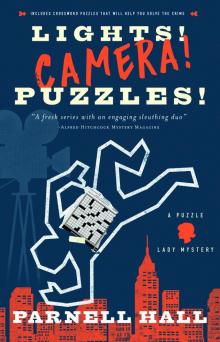 Lights! Camera! Puzzles!
Lights! Camera! Puzzles!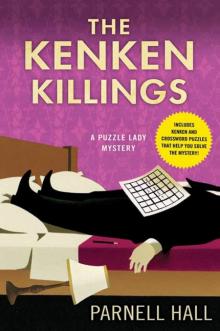 The KenKen Killings
The KenKen Killings 12-Scam
12-Scam The Puzzle Lady vs. the Sudoku Lady
The Puzzle Lady vs. the Sudoku Lady 2 Murder
2 Murder 7 Shot
7 Shot You Have the Right to Remain Puzzled
You Have the Right to Remain Puzzled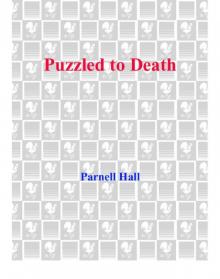 Puzzled to Death
Puzzled to Death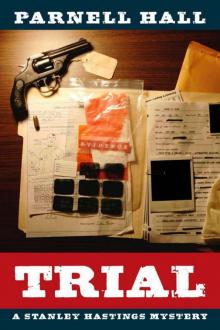 11-Trial
11-Trial The Witness Cat (Steve Winslow Mystery)
The Witness Cat (Steve Winslow Mystery) With This Puzzle, I Thee Kill
With This Puzzle, I Thee Kill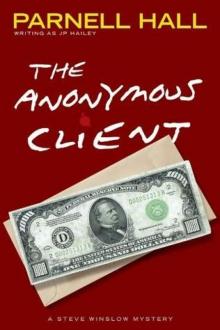 The Anonymous Client sw-2
The Anonymous Client sw-2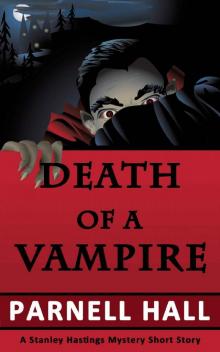 Death of a Vampire (Stanley Hastings Mystery, A Short Story)
Death of a Vampire (Stanley Hastings Mystery, A Short Story)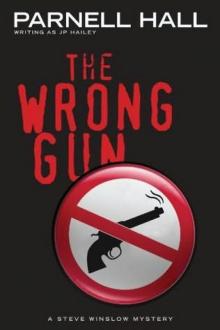 The Wrong Gun sw-5
The Wrong Gun sw-5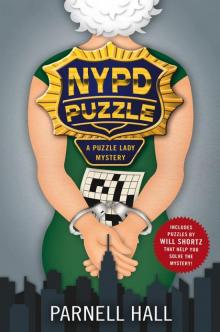 NYPD Puzzle
NYPD Puzzle 6 Juror
6 Juror 07-Shot
07-Shot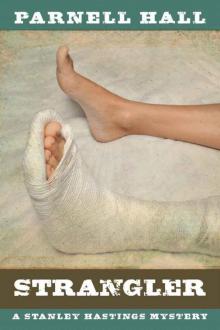 04-Strangler
04-Strangler 02-Murder
02-Murder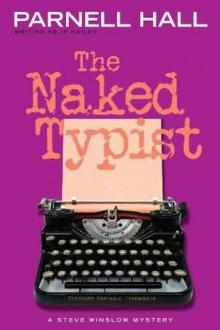 SW04 - The Naked Typist
SW04 - The Naked Typist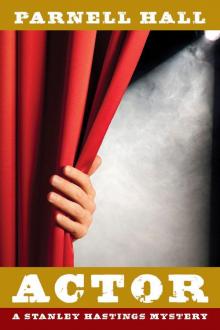 Actor
Actor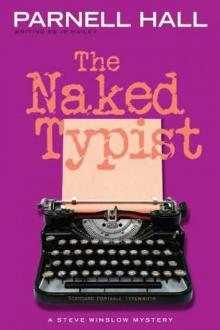 The Naked Typist sw-4
The Naked Typist sw-4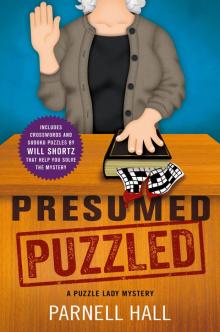 Presumed Puzzled
Presumed Puzzled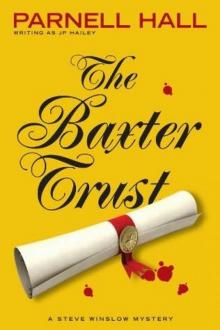 SW01 - The Baxter Trust
SW01 - The Baxter Trust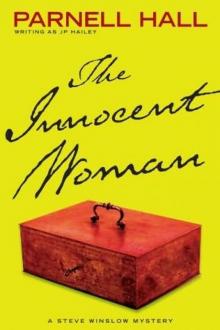 SW06 - The Innocent Woman
SW06 - The Innocent Woman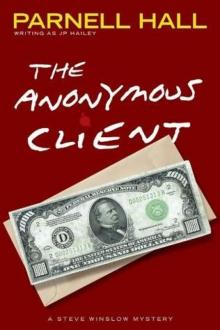 SW02 - The Anonymous Client
SW02 - The Anonymous Client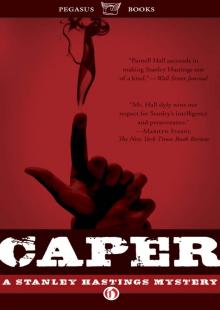 Caper
Caper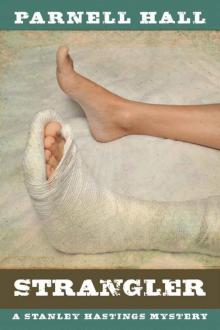 4 Strangler
4 Strangler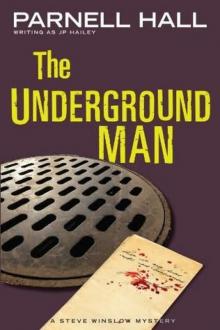 The Underground Man sw-3
The Underground Man sw-3 Manslaughter (Stanley Hastings Mystery, #15)
Manslaughter (Stanley Hastings Mystery, #15) A Puzzle to Be Named Later--A Puzzle Lady Mystery
A Puzzle to Be Named Later--A Puzzle Lady Mystery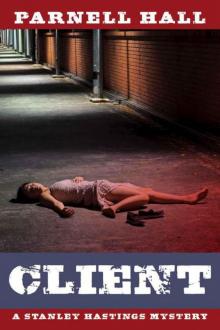 05-Client
05-Client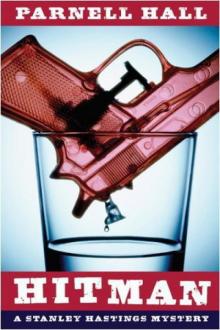 16 Hitman
16 Hitman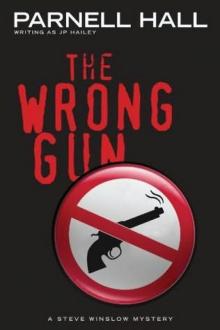 SW05 - The Wrong Gun
SW05 - The Wrong Gun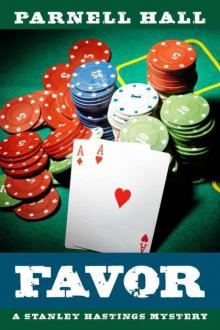 3 Favor
3 Favor Last Puzzle & Testament
Last Puzzle & Testament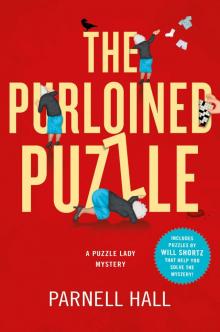 The Purloined Puzzle
The Purloined Puzzle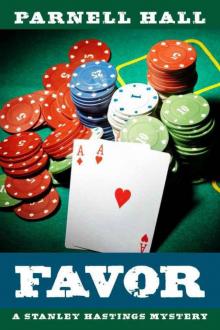 03-Favor
03-Favor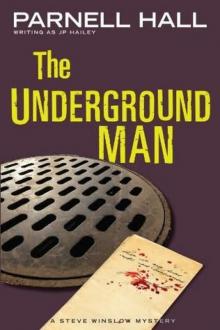 SW03 -The Underground Man
SW03 -The Underground Man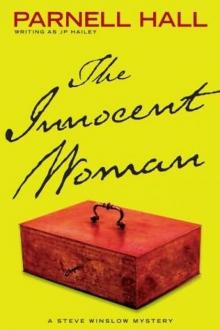 The Innocent Woman sw-6
The Innocent Woman sw-6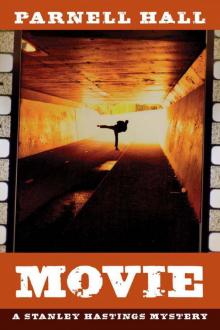 10 Movie
10 Movie 06-Juror
06-Juror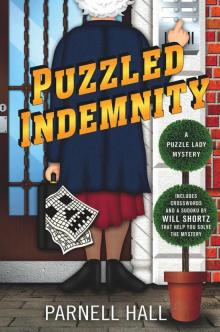 Puzzled Indemnity
Puzzled Indemnity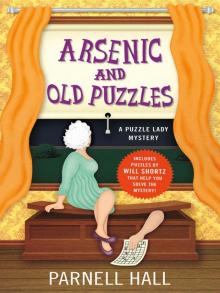 Arsenic and Old Puzzles
Arsenic and Old Puzzles Dead Man's Puzzle
Dead Man's Puzzle Safari
Safari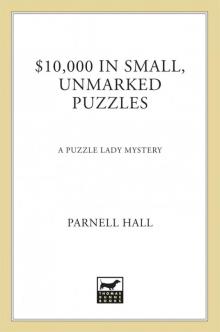 $10,000 in Small, Unmarked Puzzles
$10,000 in Small, Unmarked Puzzles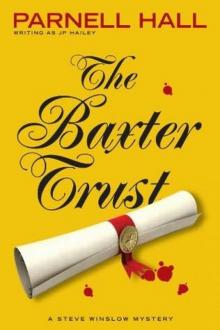 The Baxter Trust sw-1
The Baxter Trust sw-1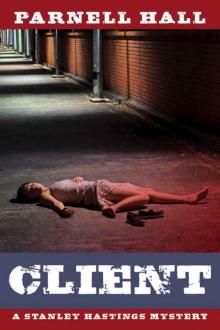 5 Client
5 Client Cozy (Stanley Hastings Mystery, #14)
Cozy (Stanley Hastings Mystery, #14)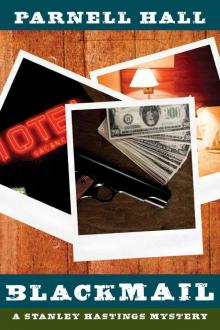 Blackmail
Blackmail A Puzzle in a Pear Tree
A Puzzle in a Pear Tree A Clue for the Puzzle Lady
A Clue for the Puzzle Lady Clicker Training (Stanley Hastings Mystery, A Short Story)
Clicker Training (Stanley Hastings Mystery, A Short Story)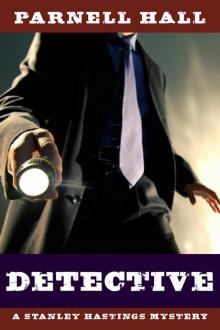 Detective (Stanley Hastings Mystery Book 1)
Detective (Stanley Hastings Mystery Book 1) 13 Suspense
13 Suspense